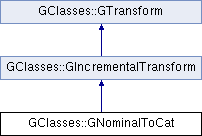This is sort-of the opposite of discretize. It converts each nominal attribute to a categorical distribution by representing each value using the corresponding row of the identity matrix. For example, if a certain nominal attribute has 4 possible values, then a value of 3 would be encoded as the vector 0 0 1 0. When predictions are converted back to nominal values, the mode of the categorical distribution is used as the predicted value. (This is similar to Weka's NominalToBinaryFilter.)
|
| | GNominalToCat (size_t valueCap=12, double lo=0.0, double hi=1.0) |
| |
| | GNominalToCat (const GDomNode *pNode) |
| | Load from a DOM. More...
|
| |
| virtual | ~GNominalToCat () |
| |
| void | preserveUnknowns () |
| | Specify to preserve unknown values. That is, an unknown nominal value will be converted to a distribution of all unknown real values. More...
|
| |
| void | reverseAttrMap (std::vector< size_t > &rmap) |
| | Makes a mapping from the post-transform attribute indexes to the pre-transform attribute indexes. More...
|
| |
| virtual GDomNode * | serialize (GDom *pDoc) const |
| | Marshal this object into a DOM, which can then be converted to a variety of serial formats. More...
|
| |
| virtual void | transform (const GVec &in, GVec &out) |
| | See the comment for GIncrementalTransform::transform. More...
|
| |
| virtual void | untransform (const GVec &in, GVec &out) |
| | See the comment for GIncrementalTransform::untransform. More...
|
| |
| virtual void | untransformToDistribution (const GVec &in, GPrediction *pOut) |
| | See the comment for GIncrementalTransform::untransformToDistribution. More...
|
| |
| | GIncrementalTransform () |
| |
| | GIncrementalTransform (const GDomNode *pNode) |
| |
| virtual | ~GIncrementalTransform () |
| |
| const GRelation & | after () const |
| | Returns a relation object describing the data after it is transformed. More...
|
| |
| const GRelation & | before () const |
| | Returns a relation object describing the data before it is transformed. More...
|
| |
| GVec & | innerBuf () |
| | Returns a buffer of sufficient size to store an inner (transformed) vector. The caller should not to delete the buffer. The same buffer will be returned each time. More...
|
| |
| virtual GMatrix * | reduce (const GMatrix &in) |
| | This calls train, then calls transformBatch, and returns the result. More...
|
| |
| void | setAfter (GRelation *pRel) |
| | Sets the after relation. Takes ownership of pRel. More...
|
| |
| void | setBefore (GRelation *pRel) |
| | Sets the before relation. Takes ownership of pRel. More...
|
| |
| void | train (const GMatrix &data) |
| | Trains the transform on the data in pData. (This method may be a no-op for transformations that always behave in the same manner.) More...
|
| |
| void | train (const GRelation &pRelation) |
| | "Trains" the transform without any data. More...
|
| |
| virtual GMatrix * | transformBatch (const GMatrix &in) |
| | This assumes that train has already been called, and transforms all the rows in in returning the resulting matrix. The caller is responsible for deleting the new matrix. More...
|
| |
| virtual std::unique_ptr< GMatrix > | untransformBatch (const GMatrix &in) |
| | This assumes train was previously called, and untransforms all the rows in pIn and returns the results. More...
|
| |
| | GTransform () |
| |
| | GTransform (const GDomNode *pNode) |
| |
| virtual | ~GTransform () |
| |

 Public Member Functions inherited from GClasses::GIncrementalTransform
Public Member Functions inherited from GClasses::GIncrementalTransform Public Member Functions inherited from GClasses::GTransform
Public Member Functions inherited from GClasses::GTransform Protected Member Functions inherited from GClasses::GIncrementalTransform
Protected Member Functions inherited from GClasses::GIncrementalTransform Static Public Member Functions inherited from GClasses::GIncrementalTransform
Static Public Member Functions inherited from GClasses::GIncrementalTransform